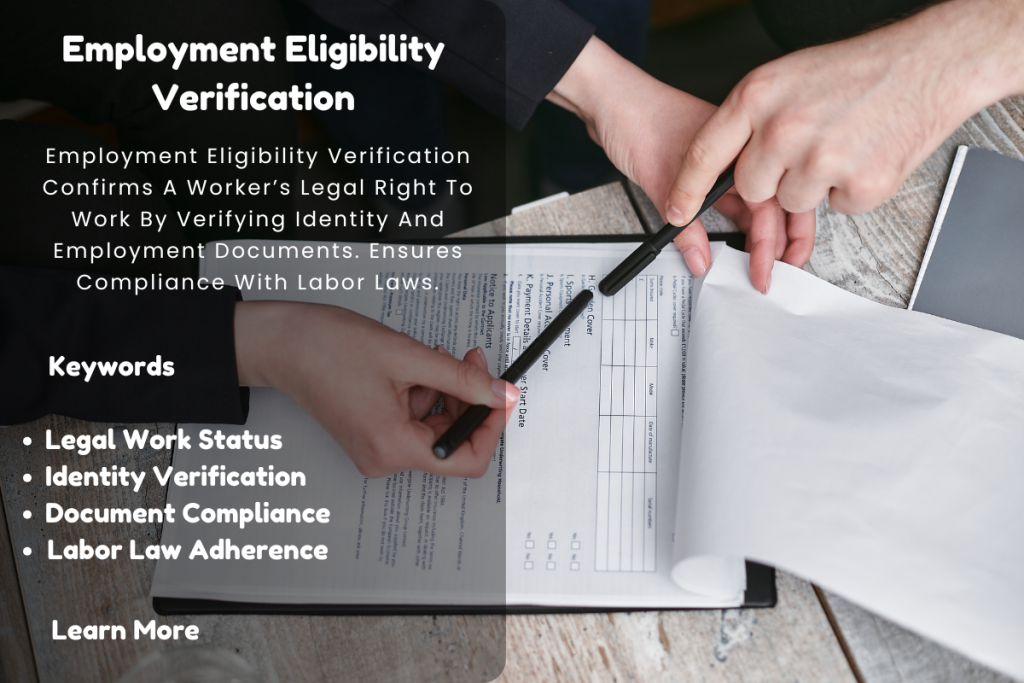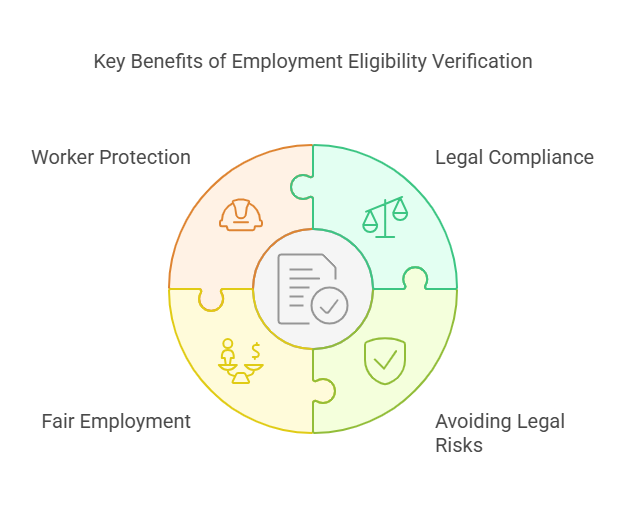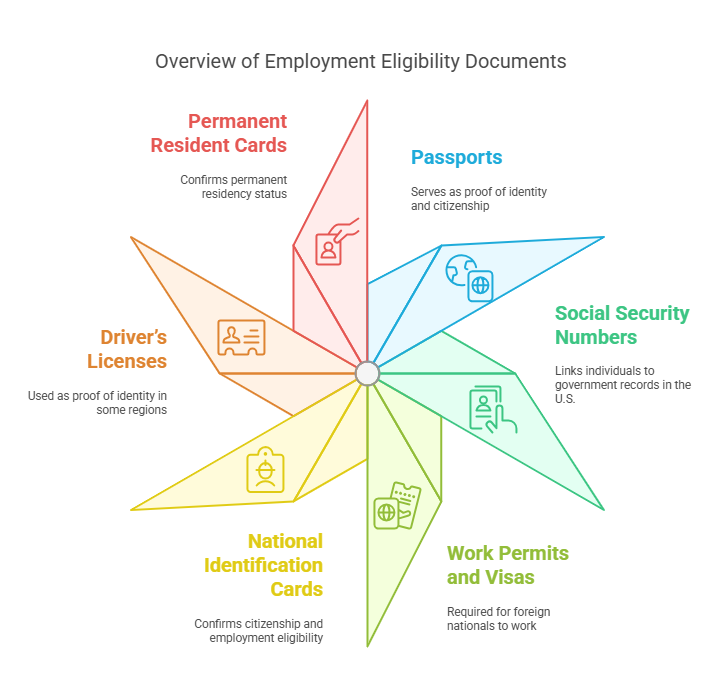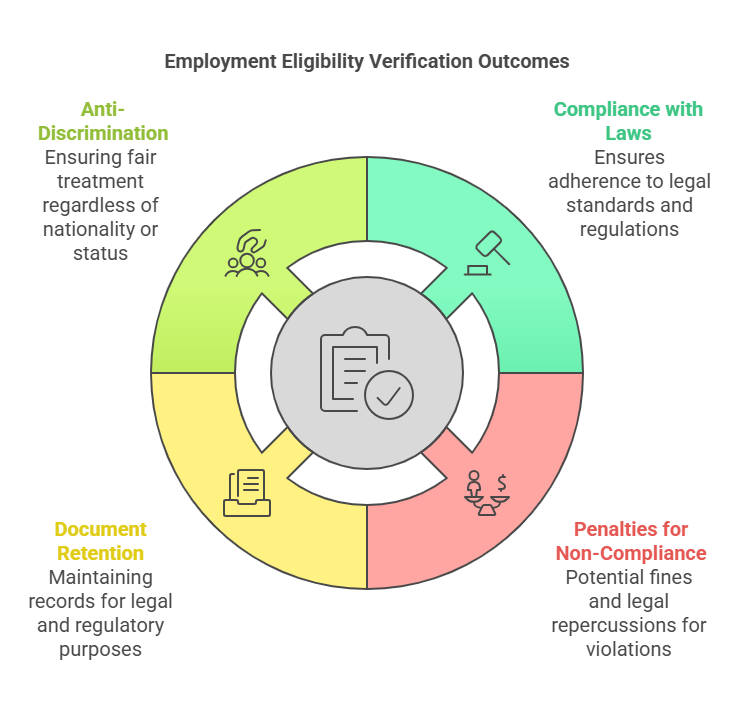Comprehensive Guide to Employment Eligibility Verification

Introduction to Employment Eligibility Verification
Employment eligibility verification is the process by which employers ensure that their employees are legally authorized to work in a given country. This step is essential in the hiring process to ensure compliance with immigration and labor laws, protecting both employers and employees.
What is Employment Eligibility Verification?
Employment eligibility verification involves confirming that an employee is authorized to work, typically by reviewing documents such as passports, work permits, or national IDs. Employers must verify this before hiring to comply with legal requirements and avoid penalties.
Importance of Employment Eligibility Verification in the Hiring Process

- Legal Compliance: Employers must verify work eligibility to follow immigration laws and avoid fines.
- Avoiding Legal Risks: It prevents the hiring of unauthorized workers, protecting businesses from penalties.
- Fair Employment: Ensures all employees meet legal requirements, promoting fair practices.
- Worker Protection: Safeguards workers by ensuring they have the legal right to work.
Who Requires Employment Eligibility Verification?
- Employers: Legally required to verify eligibility for all new hires.
- Government Agencies: Agencies like USCIS (U.S.) enforce employment laws and monitor eligibility compliance.
Common Examples of Employment Eligibility Verification
- I-9 Form (U.S.): A U.S. employer uses the I-9 form to verify the identity and work authorization of their employees.
- Other Countries: Nations like the UK and various European countries have their own documentation systems for employment eligibility, such as work visas and national IDs.
Types of Employment Eligibility Verification Documents & How to Obtain Them
Employment eligibility verification requires employees to provide specific documents to prove they have the legal right to work in a given country. These documents may vary by country, but generally include evidence of identity, citizenship, or work authorization. In this section, we’ll explore the most common types of documents used for employment eligibility verification, how they are obtained, and how employers can verify them.
Common Types of Employment Eligibility Verification Documents

- Passports: A passport serves as proof of identity and citizenship. It can also indicate work authorization if the person holds a work visa or permit. It is widely accepted for international employment verification and is often used in countries like the U.S., the UK, and many European nations.
- Social Security Numbers (SSN): In the United States, a valid Social Security Number (SSN) is crucial for employment eligibility verification. The SSN links the individual to government records, confirming their ability to legally work in the country. Social security numbers are typically issued at birth or during immigration processes.
- Work Permits and Visas: Work permits and visas are required for foreign nationals who wish to work in a country. In the U.S., these can include H-1B visas, student work permits, and Green Cards, which all indicate a person’s eligibility to work in the country.
- National Identification Cards: In many countries, a national ID card serves as proof of identity and eligibility to work. Countries like France, Germany, and others use national ID cards to confirm both citizenship and employment eligibility.
- Driver’s Licenses: A valid driver’s license can also be part of the verification process, particularly in some regions, alongside other forms of ID like social security numbers. A driver’s license may serve as proof of identity, but it is often used in conjunction with other documents.
- Permanent Resident Cards (Green Cards in the U.S.): A Permanent Resident Card, commonly referred to as a Green Card in the U.S., confirms an individual’s permanent residency status and eligibility to work in the country without restrictions.
How to Obtain Employment Eligibility Documents
Obtaining the necessary documents depends on an individual’s citizenship status, the country in which they live, and the specific document in question:
- Passports: Passports can be obtained through the relevant government authorities (e.g., U.S. Department of State, UK Home Office) and are typically issued at birth or via naturalization.
- Social Security Numbers: In the U.S., Social Security Numbers are assigned at birth or through immigration processes. Individuals without an SSN can apply at the Social Security Administration.
- Work Permits and Visas: Foreign nationals or those wishing to work in a foreign country must apply for a work permit or visa from the country’s immigration authority. The process typically requires employer sponsorship or meeting certain qualifications.
- National ID Cards: Issued by a national government, these are typically required at birth or when individuals gain citizenship or permanent residency.
- Driver’s Licenses: These can be obtained through a country’s motor vehicle authority, often after meeting residency requirements and passing driving tests.
How Employers Can Verify Employment Eligibility
Once an employee submits the required documents, employers must verify their authenticity and ensure compliance with legal requirements. For example, in the United States, this process typically involves filling out the Form I-9, where employers review original documents that establish both identity and employment authorization.
- Document Review: Employers must examine the submitted documents to ensure they are valid, unexpired, and match the information provided by the employee.
- Completing the Verification Process: Employers are responsible for ensuring all required fields in verification forms are completed and that documents are verified before the employee begins working.
- Tracking Expiry Dates: Employers should track document expiration dates, especially for work visas or permits, and ensure eligibility is re-verified when necessary.
How Employees Submit Their Documents
Employees typically submit their documents during the hiring process, either at the time of the job offer or shortly before starting work. Some employers may utilize electronic verification systems that allow employees to upload scanned copies of their documents, streamlining the process.
Precisehire’s Role in Employment Eligibility Verification
For businesses looking to simplify the employment eligibility verification process, Precisehire offers comprehensive employment screening services. By using Precisehire, employers can verify employment eligibility quickly and efficiently, ensuring compliance with immigration and labor laws. Precisehire also provides services like background checks, helping employers make informed hiring decisions while reducing the risk of non-compliance.
Data Table: Comparison of Employment Eligibility Documents
| Document Type | What It Verifies | Example Usage | Country/Region |
|---|---|---|---|
| Passport | Identity, citizenship, and potential work authorization | Used by foreign nationals to verify eligibility | Global |
| Social Security Number (SSN) | Employment eligibility and tax records | Required for employment in the U.S. | United States |
| Work Permit / Visa | Authorization to work for foreign nationals | Work visas like H-1B in the U.S. or Tier 2 in the UK | United States, UK, Europe |
| National ID Card | Identity and employment eligibility | Used for citizens in countries like France or Germany | European countries |
| Driver’s License | Identity verification | Used as a secondary document for identity in some countries | U.S., UK, Canada, etc. |
| Permanent Resident Card (Green Card) | Permanent resident status and work eligibility | Used to confirm permanent residency in the U.S. | United States |
This table highlights the different types of documents used in employment eligibility verification and provides examples of how they are applied in various countries.
Legal Aspects of Employment Eligibility Verification
Employment eligibility verification is governed by laws and regulations specific to each country. These regulations ensure that workers are authorized to work within a country and that employers comply with immigration and labor laws. Here are some key legal aspects:

- The U.S. I-9 Process: In the United States, the Form I-9 is used to verify an employee’s identity and work authorization. Under the Immigration Reform and Control Act (IRCA), employers are required to verify the employment eligibility of all new hires, regardless of nationality. Employers must complete this verification within three days of the employee’s first day of work.
- Penalties for Non-Compliance: In many countries, employers face severe penalties for failing to complete employment eligibility verification. In the U.S., fines for non-compliance with I-9 requirements can range from hundreds to thousands of dollars per violation, with even harsher penalties for knowingly hiring unauthorized workers. Other countries also impose fines or sanctions on employers who violate employment eligibility verification laws.
- Document Retention and Reverification: Employers are required to keep records of completed I-9 forms and documents used for verification for a specific period. In the U.S., these records must be retained for at least three years after the hire date or one year after the employee leaves the company, whichever is later. Additionally, employees with temporary work permits or visas must be reverified when their documents expire.
- Anti-Discrimination Laws: It is crucial that employment eligibility verification is done uniformly for all employees. Employers cannot discriminate against employees based on their national origin or citizenship status. U.S. law, for example, prohibits employment discrimination based on race, color, or national origin during the verification process. Employers must treat all employees equally when verifying their eligibility.
Frequently Asked Questions (FAQs)
What documents are acceptable for employment eligibility verification?
Acceptable documents typically include passports, social security cards, national IDs, work permits, or Green Cards. These documents prove both identity and work authorization. The exact documents may vary depending on the country’s specific requirements.
How long are these verification documents valid?
The validity of documents depends on the type of document. For example, a passport may be valid for 5-10 years, while a work permit may be temporary and expire within a few years. It is important for both employers and employees to keep track of expiration dates and reverify work eligibility as required.
What happens if employment eligibility verification is not completed?
If verification is not completed, employers may face legal penalties, fines, and other sanctions. In the U.S., failure to verify employee eligibility can result in fines of up to $2,000 for each unverified employee.
Can an employee be hired without completing the verification process?
No, an employee cannot be legally hired without completing employment eligibility verification. Employers are legally obligated to verify the eligibility of every new hire before they begin work.
Can an employee provide electronic copies of documents for verification?
Yes, in some cases, employers may accept electronic copies of documents for verification. However, it is essential to verify the authenticity of these documents through trusted verification systems or in-person checks.
Conclusion
Employment eligibility verification is a fundamental step in the hiring process that ensures compliance with labor and immigration laws. Employers must verify that their employees have the legal right to work, and failure to do so can result in serious consequences. The process involves reviewing documents such as passports, social security cards, work permits, and national IDs to confirm eligibility.
The legal framework surrounding employment eligibility verification, such as the I-9 process in the U.S., mandates that employers keep accurate records and reverify employee eligibility when necessary. Additionally, employers must adhere to anti-discrimination laws and avoid unfair treatment during the verification process.
By following proper verification procedures, employers protect their business from legal liabilities, promote fair labor practices, and ensure a compliant workforce. Services like Precisehire can help streamline the verification process, making it easier for businesses to stay compliant and hire the right candidates with confidence.
Key Takeaways:
- Employment eligibility verification is a legal requirement for employers to confirm that their employees are authorized to work.
- Common documents for verification include passports, social security numbers, work permits, and national IDs.
- Employers must complete verification within specific timelines, maintain records, and reverify certain documents as necessary.
- Failure to comply with verification requirements can lead to penalties and legal consequences for employers.
- Services like Precisehire offer valuable tools to simplify the employment screening and verification process.
Adhering to employment eligibility verification protocols is essential for both employers and employees, ensuring a lawful and efficient hiring process.
